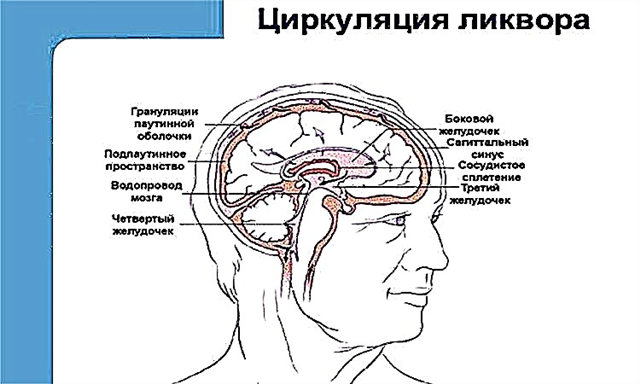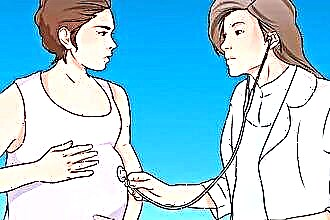Hypotension is considered to be less dangerous than hypertension. And yet, low blood pressure cannot be called the norm, so a negative effect on the body is inevitable. In some cases, an acute attack of hypotension can lead to death or the development of serious pathologies. This can happen to anyone, and a person must be prepared for such a situation. What if the pressure drops sharply? First of all, do not panic, but seek help from traditional or alternative medicine.
 Hypotension is a disorder in the work of the cardiovascular system, which is characterized by a decrease in blood pressure. The following indicators are considered reduced: systolic below 95, and diastolic below 65 mm Hg. Art.
Hypotension is a disorder in the work of the cardiovascular system, which is characterized by a decrease in blood pressure. The following indicators are considered reduced: systolic below 95, and diastolic below 65 mm Hg. Art.
Two forms of the pathological condition can be distinguished: acute and chronic.
The chronic form occurs at birth (primary hypotension) or acquired during life (secondary hypotension).
In addition, there is such a thing as physiological hypotension. Such a state does not in any way affect the well-being of a person who gets used to low blood pressure and lives with it all his life (pressure is kept at a low level all the time). His body gradually adapts to this feature of the vascular system. Usually, speaking of physiological hypotension, they mean the congenital form of pathology.
There are other options for physiological lowering of pressure:
- orthostatic;
- compensatory;
- postprandial.
These options are possible only in a certain situation and are temporary (except for the last).
Orthostatic type of hypotension manifests itself during sudden movements, with a rapid change in body position (rapid rise from bed). This condition is possible during or after vigorous sports training. Sometimes fainting develops in these situations.
If the decrease in pressure occurs after eating, they speak of the postprandial type.
A compensatory decrease in the blood effect on the walls of blood vessels occurs in those who constantly live high in the mountains.
The chronic form of pathology continues for a long time or lasts a lifetime. At the same time, a person's condition is stable, a sharp deterioration in health does not occur, systems and organs are gradually built into the unhurried rhythm of the heart and blood vessels, and begin to function normally.
The acute form occurs suddenly, develops rapidly, in a few minutes or hours. This condition is the most dangerous, because in a short period of time the body cannot adapt to the dramatically changed conditions of life.
If blood pressure is constantly lowered - what could be the reason?
- heredity;
- pregnancy;
- VSD (vegetative dystonia);
- the use of drugs with a side effect in the form of lowering blood pressure;
- heart muscle diseases (heart defects, heart failure);
- diseases of internal organs (tumor, hepatitis, stomach ulcer, thyroid disease, anemia).
Separately, you can add special climatic conditions as the reason for the development of compensatory hypotension.
Indicators of reduced pressure
A list of the following symptoms will help to draw a portrait of a hypotonic person:
- I constantly want to sleep, suffer from bouts of yawning;
- any kind of activity quickly tires;
- special sensitivity of the body to a sharp change in weather conditions (meteorological dependence);
- increased physical activity is poorly tolerated;
- excessive sweating;
- freezing of the limbs even in a warm room;
- headache of varying intensity, sometimes with nausea;
- heart pain, stomach, joint, or muscle pain;
- fast pulse;
- feeling overwhelmed all day, starting in the morning;
- lethargy and indifference to others and oneself, depression;
- a person is irritated for no apparent reason;
- dizzy, darkening in the eyes, fainting is possible;
- makes a noise in the ears;
- distracted attention;
- tendency to "seasickness".
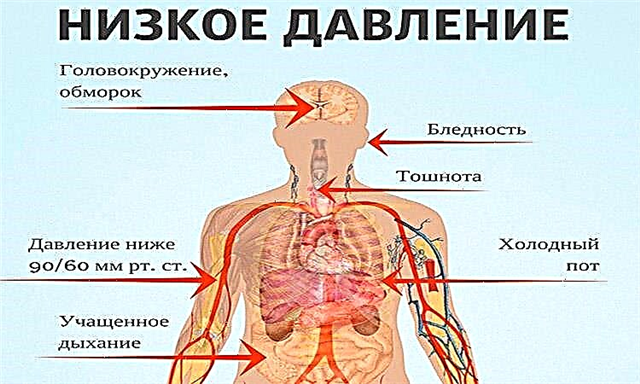
Usually such a person has a thin physique, looks weak and fragile. He has no blush, pale lips.
Pressure dropped sharply: what to do
A sudden drop in blood pressure is a rather dangerous condition. This is an acute form of hypotension. The hypotonic will feel bad if the pressure rises sharply. With hypertension, it is equally bad when the pressure rises or falls sharply. In the latter case, the situation is aggravated by the fact that the body is accustomed to high pressure readings, and a sharp jump down can cause a shock (collapse). In addition, many signs of acute hypotension are similar to the manifestations of a hypertensive crisis. What is the threat? A hypertensive person, out of habit, grabs onto drugs that lower blood pressure (which have a quick and powerful effect). The result of using such drugs can be very deplorable in this state.
To avoid such troubles, for any suspicious symptoms, it is necessary to measure the pressure.
Blood pressure surges that cause acute hypotension can be caused by:
- An autonomic nervous system disorder that can respond with sudden increases or decreases in blood pressure when stressed.
- An attack of heart failure, when the heart cannot cope with the function assigned to it.
- With pulmonary edema, you can also observe a sharp jump in pressure down, it is accompanied by a cough with bloody foam, an unnatural whiteness of the skin, a lack of air.
- Infections that have entered the body and caused an inflammatory process, as well as intoxication.
- Anaphylactic shock, as well as a lack of blood glucose in diabetes mellitus.
- Dysfunction of the kidneys and adrenal glands.
- A side effect of the medications you are taking.
- Loss of blood, the presence of internal bleeding.
If a person has obvious signs of a sharp drop in pressure (sticky cold palms, blue lips, whitened skin, icy lower limbs, a loud noise in the head, a change in consciousness or impaired coordination of movements, severe weakness), he urgently needs help.
What can be done in the first minutes of a light-headed or fainting state?
- With a sharp drop in pressure, lay the patient down, raising his legs above the level of the heart, creating conditions for the outflow of blood from the limbs to the brain.
- Free a person from embarrassing clothing.
- Take action in case of vomiting by tilting your head to the side.
- When there is a downward pressure jump, it is necessary to carry out warming procedures (hot sweet coffee or tea with chocolate, a warm blanket or a heating pad for the legs).
- Massage the earlobes and the entire ear.
Recommended drug treatment
Treatment with drugs is prescribed when urgent care is required in severe conditions, as well as in chronic hypotension, which occurs with complications and pronounced symptoms.
What drugs are used if the pressure drops?
- Agents that stimulate the adrenergic system. Indications: drowsiness, loss of strength, chronic fatigue, lethargy of reactions. The action of the drugs is slow; for a visible effect, a course of two to four months is needed. This group includes: "Sidnofen", "Mexidol", "Sidnokarb", "Mezocarb".
- A group of analeptic drugs. They excite the parts of the brain that are responsible for the work of blood vessels and respiratory organs, and can improve short-term memory. Analeptics improve the patient's mood, make him more efficient, relieve fatigue, and add energy. Prescribe medicines for a single dose or in short courses. An example of drugs: "Centedrin", "Cordiamin".
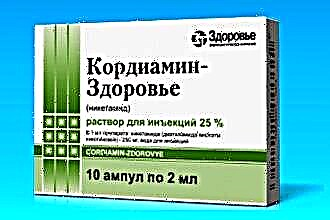
- Spinal cord stimulants. "Securinin" - has few side effects, is taken in a short course.
- Medicines from the group of adrenergic agonists. They serve to stimulate alpha-adrenergic receptors in peripheral vessels, as a result of which the effect on their walls of the blood flow increases. What to do in case of a sharp drop in pressure? Apply drugs for emergency care: Metazone, Fetanol. For daily supportive and preventive action take "Gutron" and "Regulton".
- Anticholinergic drugs. They are used when a decrease in pressure is combined with manifestations of vegetative vascular dystonia. These drugs are: Bellaspon, Belloid.
- Nootropic drugs help to normalize the blood supply to the parts of the brain, help the body get used to the aggressive effects of the surrounding climatic conditions. Medicines are used in long courses, for example: "Piracetam", "Phenibut", "Pantogam".
- Among the vitamin complexes, one should choose those in which vitamins B6, E, C are present, as well as minerals in the form of phosphorus and calcium. Vitamins will help relieve fatigue, increase endurance and work capacity, and recover from severe shocks.
For effective emergency care, they also use "Caffeine", "Citramon", "Ephedrine".
Physiotherapy for hypotension
Physiotherapy is often used to treat various pathological conditions. The greatest effect can be achieved by using this method in combination with other therapeutic effects. What procedures are indicated for a person with low blood pressure?
- Irradiation with ultraviolet light using special lamps that act through the skin of the body on the vascular system, accelerate blood circulation.
- Using decimeter current. Electrical impulses stimulate the adrenal glands, which release hormones to increase blood pressure.
- Hypotension can be treated with critotherapy. The essence of such therapy is as follows: a person is in a special cell for some time (up to 3 minutes). There, the combination of air and nitrogen creates a low temperature (up to minus 160 degrees). Getting from an ordinary environment to an extreme one, and then leaving again to an ordinary one, a person is exposed to sharp changes in temperature.
- Electrophoresis procedures on the neck area using potassium salts enhance the conduction of nerve impulses.
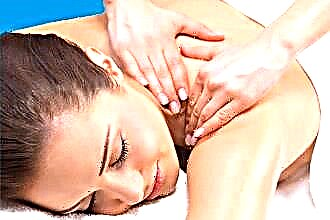
- Water procedures have a beneficial effect on the hypotonic state. For example, treatment with a circular shower (otherwise - Charcot's shower) consists in massaging the body with jets of water, which are fed in different directions and with different intensities (in the form of a fan, raindrops, etc.). Healing baths are often used in spas. For example, baths with iodine and bromine, nitrogen, radon or pine needles.
- A massage parlor is a place where benefits are combined with pleasant sensations. For a hypotonic person, an important zone of manual influence will be the area of the cervical spine and shoulders.
As with any treatment, physiotherapy should be used if there are no contraindications.
Home treatments for hypotension
It is possible to provide significant help with pronounced symptoms of hypotension without resorting to medications.
Folk remedies have a tonic, strengthening, supportive effect on the body, help to raise blood pressure, improve work capacity, and relieve fatigue.
The most commonly used and effective natural remedies are:
- Ginseng, Eleutherococcus, Schisandra, Echinacea, Manchurian Aralia, Leuzea - all these herbs are used in tincture form.
- It is useful to drink pomegranate and celery juices.
- Honey has many medicinal properties, mixing it with dried apricots, you can get an excellent tool for strengthening strength. Tasty and healthy.
- You can brew medicinal herbs: St. John's wort, Tartar, Zamaniha and Rhodiola rosea (these plants use a root), motherwort.
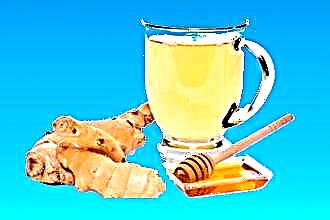
Ginger tea
Grind the ginger into powder and add it a little to the tea leaves (about 0.5 teaspoon). Then it is brewed and drunk in the morning, at lunchtime and in the evening. Course - a week.
Herbal mixture
Equal parts of the ingredients are mixed and poured with boiling water (a teaspoon per 500 ml of water). Cook all this for half an hour, then let it brew for an hour. Drink three times a day or more (to quench thirst instead of regular water). Single dose - 250 ml. The composition includes: peppermint, tansy in the form of seeds, rose hips in the form of fruits, viburnum berries, hawthorn inflorescences, celandine.
Coffee elixir
Mix lemon juice (from one lemon), half a liter of honey, ground and roasted coffee beans (50 g). Then everything is placed in the cold. The mixture should be consumed in an amount of 5 ml after each meal (after two hours).
You can increase the pressure at home by eating something salty, drinking strong tea or coffee with sugar. Chocolate and cocoa have a good tonic effect.
Alcohol can also be used as a medicine to raise blood pressure quickly. For example, a small dose of cognac or red wine.
Aromatherapy based on oils of pine, cloves, mint, lemon, rosemary, basil, etc. will help you to cheer up.
Reception of tonic baths, acupressure self-massage, therapeutic gymnastic complex - all these methods are good for improving the condition with reduced pressure.
Medication-free can be managed by optimizing your lifestyle:
- Getting enough sleep is important. You can't get up abruptly in the morning.
- It is useful to observe the regime moments during the day.
- You need to go in for sports. Quiet running, all kinds of walking, swimming, cycling are useful. You can do squats more often.
- Outdoor walks are recommended. This will enrich the brain with oxygen, which it lacks in case of hypotension.
- An excellent way to add vitality is to take a cold or contrast shower.
- Adequate nutrition will help eliminate many problems. A hypotonic person needs to eat well in the morning, start the day with a cup of tea or coffee. Food should be high in calories and contain vitamins. Spicy and salty food in moderation is not prohibited.
- A positive attitude towards yourself and the world around you is a guarantee of good health.
Hypotension cannot be ignored, otherwise life will become a dull and dull burden. Constant lethargy and apathy, lack of desire to do something and actively participate in the events of the surrounding world will not lead to anything good. And vice versa, cheerfulness and energy will allow you to enjoy life, enjoy every day. In addition to a bad mood and weakness, hypotension can lead to nervous and physical exhaustion, as well as to serious disturbances in the work of internal organs and systems. A sharp drop in blood pressure can result in death, especially for hypertensive patients. Therefore, it is so important to be able to recognize such a condition and provide the correct assistance.





